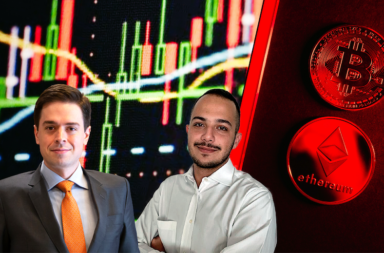To where is the money probably going and what are the opportunities.
Almost 4 years ahead of Vindi, And almost 20 years acting in the financial (and technologic) segment, i came across an important discussion with one of the directors of BBVA Ventures, last week in São Paulo, that motivated me to write this text to illustrate where is the gold in Brazil, when the subject is fintech.
The executive question was clear: where is the real opportunity in Brazil?
I will try to illustrate (As one of the Market agents) in the text below, to where investors, executives, bankers, and entrepreneurs should look.
Fintech doesn’t break banks
What sells the most on the newspapers is that Fintechs are going to break the banks. It’s not quite like this. We have a highly regulated market, full of rules that, in a certain way, make innovation harder.
The point is that the banks itself, are fighting against people’s popular conscious, That tend to naturally defend an startup that is defying banks. It’s David X Golias. And people need an pretty history to get an hold of. That why the expression “fintechs are going to break the banks” always reaches a good level of attention.
What is a fintech, then?
“Technologic and financial solutions with focus on the user. Be company or consumer” Take a look at José’s Prado (Conexão Fintech) at Innovation Pay, in a quick definition that I like a lot.
In order to have a fast and easy attraction of the media and the popular, it’s nice to have a fintech. But there’s a lot of rustle. Many technological solution claim itself to be, but they are not in fact. What is normal. But the biggest rustle lays most of times in “stage entrepreneurs” taking the term to itself:
Mentoring (without having a fintech) and distorting the perception of banks and investors, watch out for the vampires.
We have a small portion o fintechs generating income. I will take chances and say 90% of them doesn’t generate more than R$ 1 million revenues/year. What’s not very attractive for banks to participate of more strategic deals with them. But that’s not a big problem, depending of the fintech strategy.
On the other hand, the opportunity to “crack the wall” it’s large.
What I see happening, in fact, it’s a big collaboration between banks and fintechs in the country. Not just banks, but also funds (especially FIDC’s) and brokers. This whole “fintechs are going to ruin the banks” thing it’s just media talk.
Unless there’s some of those startups around paying dividends of R$ 11 Billion to their partners, like Itaú did in 2016. Now that they are starting to bother, this is really a fact. Like in other places in the world, they are going to promote a financial change, that will have the collaboration of the banks. And in some cases, acquisitions will be necessary.
But that to happen, fintechs will need to have expressive numbers.
50 million clients without bank account’s.
You’ve probably already heard this statistic. That’s practically a whole country waiting to be attended. It’s a lot of people and a lot of cash involved. 50 million people are 5 Portugal’s waiting to be conquered. Portugal’s population is 10 million people.
As one of the partners of the innovation Pay event, that’s going to its second edition this year, I felt the energy of the participants in 2016 on my skin. It was clear that the hype of the fintechs had reached its maximum stage. 400 people were disputing seats to see this movement. They were entrepreneurs, executives (VP’s, CEO’s and big company directors) and investors chasing the new face of the financial segment.
After all, all frisson caused by the media (the mainly responsible for the hype on fintechs) preceded this curiosity.
Part of the cash, should (and must) go to this “unbanked” business. Not even the banks would be able to solve this huge problem. That’s the sign that the solution can, in fact, come from fintechs. If a farmer can’t have access to the financial system, it’s a problem of the country, and an opportunity of the innovator. The hint is: “go and do it, pal”. Leave the Rio – São Paulo focus and take your team to the north and northeast of the country and try to solve this somehow.
I’ll say one thing: The struggle there it’s quite tough. Distribute a financial solution where not even piped water has reached is, at least, believing in miracles.
To “bankarize’’ a person is, at least, the fintechs social commitment. And you may believe it, if an entrepreneur achieves this, banks are going to dump a truck of cash in order to support.
Hacker Culture
If there’s one thing that doesn’t surprises me its skilled folks developing software’s in Brazil. Despite being a big challenge to find the right person, the country has a well sedimented culture when it’s about developing those software’s. This reality is so latent, that we are losing a large amount of professionals to countries like Germany, Canada and US, that it has been digging a hole in Brazil’s technology teams. Dollar, Euro currency and a less harsh life, make those people an easy target to companies like Google (In everywhere), Booking (Amsterdam) and others techs.
Obviously we got a lot less of those persons here. But when we got them, they really surprise.
Allying this to bank technology, where we are a reference since the 80’s, we have a completely formed environment to grow In garages, ready to use solutions to plug in banks and financial apps. There are some ultra high tech folks building robots, platforms of funds comparison, mobile payments and various fintech solutions. It’s happening. There is a lot of solutions popping, without minimum investors support. Here’s an important gold chest.
Only this year, I received 10 decks from good investors, with prototypes ready to launch. Wish I had being able to analyze more.
Regulation
At the same time that the regulation here it’s very strong (and there’s those who say that it’s not), lacks everything to allow part of the population to have access to good stuff.
Here in the country, the violation of financial rules can result in jail. At the same time that Banco Central is an excellent instrument to sustain innovation, it has also clear rules that always stumble in the mind of a passionate entrepreneur.
But the disclaimer here is the following: Banco Central is a large (and positive) instrument to fintechs. It receives them, understand, debate, and open the doors for the discussions about market opening to begin. And there is a lot of skilled people there, believe me. On the other hand, the political influence of some banks and institutions, crush the birth of some fintech movements. Despite regulating the whole financial environment, Bacen and CVM, share some important decisions with associations formed by the monopolies. That’s terrible for the market, because they are advocating in benefit of its own protection.
This is so important, that the fintechs have already organized in a structured way. How?
Abipag – Associação brasileira de pagamentos (Brazilian Payment Association)
ABCD — Associação Brasileira de Crédito Digital (Brazilian Association of Digital Credit)
ABfintechs — Associação Brasileira de Fintechs (Brazilian Association of Fintechs)
Equity – Associação Brasileira de Equity Crowdfunding (Brazilian Equity Crowdfunding Association)
There is another initiative captained by ABStartups (Brazilian Association of Startups), to also support the fintechs, but I haven’t seen anything concrete.
They are organizing – and gaining strength to negotiate with the organs equal to equal.
Where’s our Eldorado?
50 million “unbanked”. An hacker culture and the regulamentation.
The impact of the fintech lays exactly in the unefficiency of the great banks in dealing with some critical process’s, Where they fail, it’s where fintech’s succeed. Where they can’t reach, it’s where fintech are. The ones who they don’t pay good services are the ones who fintech’s walk hand to hand. Take a look at the case of Avante.

This environment is far from the ideal. The new generation will not face bank lines. Photo: Reproduction.
I’ve participated of some meetings with VP’s and bank presidents who still frown to Nubank. Ok, but why does that happen?
Because it’s realy hard to believe that infinite money doesn’t construct innovation. To emit 1 million credit cards, without one single salesman and having to face a hacker culture is, in fact, something that tradition cant swallow. I take my financial hat of and put on my entrepreneur one to defend that what matters is growing to cases like Nubank. They will find a model that stands still, if there’s not an line in BP signalizing it.
The quick banker has already understood. In fact, Digio initiative was launched.
This post intent was to answer, in a illustrated and direct way, the question made by BBVA’s executive, as I began the text up there. In the following subsectors, i describe where is the gold to investors, companies, and to entrepreneurs that are in this sector.
Credit
I bet that at least 99% of the banks in the country still approves credit in a committee. Reinforcing: A human committee. Part of the credit approvals in the country (especially the ones given to companies) still go through a manual report analyses, financial history and credit bureaus. And that doesn’t mean that they are doing badly, on the contrary.
If there is one thing bank can calculate, it’s risk. But they’re still too far from migrating all this paper to a robot. What may facilitate the emergence of a dozen fintechs ready to solve this. And it’s already happening.
The demand is absurdly high and the inefficiency (in some institutions) is even bigger.
There is a person analyzing and pressing buttons to approve if positive or negative. The money in the credit system is here.
- Predictive analysis;
- Machine learning applied to punctuality of payments and credit deterioration;
- Analyzes automation like: Social nets, background check, user behavior and creation of new positive registrations;
- Debts renegotiations and defaulters recovery;
- Robots that map external public data a classify credit scoring.
Most of fintechs that act in this segment (of loans) use the banker correspondent to make a bridge with the consumer. But…They will have “punch” in mid-term to have its own bank or shape body for the creation of FDIC’s in order to finance its own operation, Know why?
They are masters in experience. Do a loan simulation in Lendico, Simplic and Creditas — in order to understand.
I give my highlight here to Adianta and Rapidoo. You got keep an eye on this kind of fintech. On the other hand (also working over the inefficiency of the big banks), there’s some sharp folks working on recovering money lost in loans.
Kitado, Quero Quitar and the newcomer Acerte as Contas of the Maurício Kigiela County are two examples of how banks and big companies had dedicated the whole life to develop bank technology to loan and to not recover.
The bank’s dependency in solutions like this — tends to intensify: There will be only one way left for them: To buy it. Or continue to depend on outsourced call centers.
The risk for Banks here is to try to make home and fail, like most of times they tried to copy startups.
Intelligence and data
The ones with information have a lot of stuff nowadays. The ones who have it and know how to use it, are kings. The Banco Mundialdoesn’t support Guiabolso in vain. This fintech knows more about the consumers than the own bank. And in fact, if the 3 million people putted their bank passwords in the app, it’s that the client need is the experience, not the bank.
Platforms like that already lend money (Or make references in the format of leads generation), help in the finances and know exactly what’s going to be trend in little time, after all they study the consumer profile, processing millions of data in real time.
The data worth’s gold.
Payments
We have two unicorns in this list: Nubank and Stone. The first, in a voracious growing strategy for client acquisition and the second in a monopoly break, the two most emblematic cases in credit cards sector.
Stone putted literally the d#$%* in the table and bought Elavon’s operation in the country to get in the card’s struggle. And has been doing some quite nice stuff.
And its oppening the way to newcomers that are in tune. Since the market opening, bringing Getnet->Elavon->Global Payments->First Data->PagSeguro and now Adyen, I’ve never seen so much competition in payments at the commerce. Good thing.
I bet a lot also on strategies like Neon’s and Acesso’s, granting important business on cards. One in the app, the other in the pre-paid.
They’re two references.
I bet on mobile initiatives like Moneto and AsaaS that act directly in micro and small business, always forgotten by the big financial companies.
Every card and payment sector have, by essence and model, to be born with the premise of income in day zero, that’s why companies like this end up making more income than most of fintechs of this kind.
We have in payment, maybe, the environment most sedimented in cash, investing and in income generation.
Gateways, purchasers, cards, facilitators, platforms and apps are all after the retail financial transaction.
But there’s a small portion of good payment fintech’s that deserve to be highlighted: Pagar.me, Vindi, Iugu, Superlógica, and another dozen cases. This small group make Brazil’s a hostile and complicated environment to giants like Stripe, for example—that wasn’t able to enter with strength in the country. Without mentioning players that has already consolidated and were sold like Moip, Braspag, Maxipago, Mundipagg and etc.

Here we have, installment, Payment slip, direct debt payment, defaults, fraud, and other factors that “gringos” take a while to get it. Bitcoin folks start to show their faces too. Some already processes millions per month and use the regulation to operate in Brazil. Bit.One, Mercado Bitcoin and Foxbit are incendiaries (in a good sense) and besides doing an important role of consumer education, they are references.
Take a look at Cloudwalk, that is a nice case acting in the infrastructure of various fintechs business and deserves my highlight.
There’s a lot of cash in the payments and cards sector, and few people know how to do this business with excellence.
Investments
Where’s the new XP?
This is the main question angel investors seek to answer. Keep an eye on: OiWarren, Magnetis, Vérios, Yubb and SmarttBot — every entrepreneur knows best what they are doing. If possible, try to get to know all of them.
Taking care of others people money and being such specialist font of information may be, indeed, a robot attribution. Aim the spotlight to where money goes trough. Soon it won’t make sense needing the recommendation of a bank manager to keep your money. Some of those companies will probably become brokers and banks in the future. They got all it takes for it.
Banks and brokers are watching out way to much for this, and it’s not for nothing. It’s extremely complementary to their services.
Financial Efficiency
Rede has bought Kaplen. Stone bought part of Equals. And Concil, is one of the fintechs that reshaped an critic business in Brazil: Financial conciliation. Billions are lost because there isn’t an automatic data conference.
Retails with millions of offline transactions still make the conference manually (checking the sales with the receiving in the account). Financial conciliation is a large business and is born at the line mark, with revenues potential.
Another big bleeding is the fiscal.
Few taxes solutions come up to give companies some efficiency. The investor and the big companies are going to look strongly for Fast Notas (the disclaimer here it’s that i am an investor on this one), e-Notas and Nfe.io — fiscal solutions that automates invoices billing and manage precarious technology situations of the thousands city halls in the country.
This is a big opportunity for corporate venture.
Insurances
There’s lot o f cash here. The Banks know this. The insurance market is a blue ocean to business at market breaks. The biggest name of this business of insurtech is Eldes Mattiuzz. The man founded Bidu and Youse. Back there (2011) he was at one of the first fintech initiatives that regulation killed: The Fairplace.
Insurtech should be as big as payments. As it’s still a initiative, goods business are still coming from there. Especially because Brazilians doesn’t consume insurances like they should. We have another gold pot here. That’s so truth that companies like Minuto Seguros, for example, are expressively consulted by consumers.
Looks like in this case, the sales shanel is changing hands.
Fraud and Risk
Fraud sophistication is complementary to the evolution of new technologies. Where you lose Money, you gain Money. Data leaking, electronic frauds with financial transactions, online fraud and the exposition on the digital world is a great risk. It will bleed and it will hurt: Look:
- R$ 11 billion leak out every year in Brazil, with frauds evolving fake documents and accreditation;
- Every 100 lost in Brazilian e-commerce, 3,8 are frauds.
The appearing of fintechs like IDwall (disclaimer — I’m an investor) that wakens looks from big people and the consolidation of super fintechs like Konduto’s, is going to attract more cash from companies with thirst for fraud solving. Take a look at Fábio Lacerda’s video from Bacen, corroborating with my affirmation.
We are going to open million of accounts through the internet, we will do loans, we will evaluate operations and that is going to need a lot of artificial intelligence and high technology: Things we don’t have at the banker essence, yet. The two fintechs that i know that do this with excellence are Konduto and IDwall. And few people is giving this attention. First because it’s a complex business and few can ally deep artificial intelligence development in the financial segment.
Keep an eye at those two fintechs.
Every fintech that i mentioned has entrepreneur’s way out of the line behind. There’s still a lot happening that wouldn’t fit a exclusive text. Currency Exchange and crowdfounding (that is a really white’s thing) were not mentioned at the detail. But they are cases that i believe a lot. Fintechlab’s report is indicated to have at hands fintech’s detailed by sector. Worth a lot to take a look.
I’ll end this text with a hint for entrepreneurs, executives (and bankers) and investors.
Run away from the vampires
1. Final hints for entrepreneurs: run away from bank conversations promising worlds and founds before getting to know them. Don’t put your finniest blazer for a meeting. Use a T-shirt, that’s what you use in everyday life. If the banks want to see your numbers, write an e-mail, with just one paragraph, not opening too much. EX:
- Income 2016:
- Roadmap;
- Gols.
Don’t waste time sending deck’s or formal documents. You are the number that you do to Banks. Send a deck only to investors (those who worth).
2. Final hints to executives and bankers: It doesn’t look like, but entrepreneurs are also very busy, so don’t get to thinking that your time is more valuable than theirs . While the bank has a truck of Money, fintech has a truck of problems and financial holes to take care. Don’t waste your time with ideas or prototypes. Everybody wants to turn into fintech and there’s some people mentoring without even having a business standing. Run away from “slot-Machine” events.
3. Final hints to investors: This is a regulation business , big market and technology. Be ready to receive the information that most fintechs are completely unprepared for regulation, but lookout for something that has high technology capacity. Dont put money where there isn’t a partner CTO. And search for a dude Who can stand the beating that comes with regulation and competition in this sector.
Wait until Fintech nº2.
Written by Rodrigo Dantas, founder & CEO of Vindi Rodrigo Dantas, CEO e founder of Vindi.
Quer uma dica?
Faça parte do principal encontro da comunidade de inovação e tecnologia em crédito no dia 01 de novembro em São Paulo. Saiba mais clicando aqui ou acessando http://credtech.conexaofintech.com.br/
Aproveite o desconto de 15% para nossos leitores por tempo limitado. Use o código conexaofintech ou clique aqui e garanta sua vaga.


